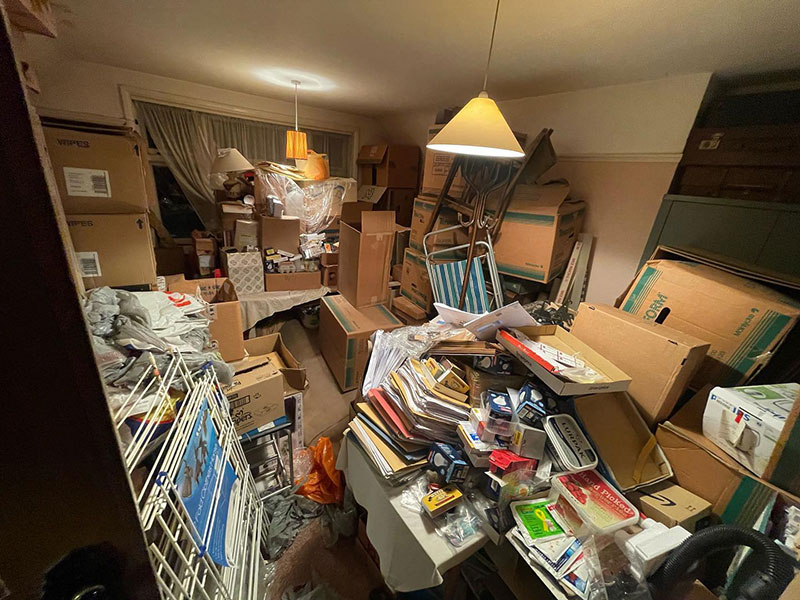|

Hoarding is a growing problem in the UK; as many as one in 20 people suffer from the condition and, because we have an ageing population and it’s more likely to affect the elderly, the numbers could rise in the years ahead.
ASAP Clearances offer hoarding house clearing services in Enfield and across London. Here we look at the medical reasons for the condition, how you should broach the subject if you think your friend or relative is a hoarder, and why you should contact us if you need any hoarded items removed from a home.
What is Hoarding?
The NHS says hoarding is “where someone acquires an excessive number of items and stores them in a chaotic manner, usually resulting in unmanageable amounts of clutter.” The items themselves aren’t usually that valuable – the type of things which are often hoarded can be found in our previous blog here. Hoarding is usually identified as a problem when it starts to interfere with that person’s daily living, so they may find it difficult to get to certain rooms such as the bathroom or kitchen. They may struggle to complete everyday tasks, such as washing, cooking, cleaning and paying their bills.
The person affected also often gets upset when someone else points out the problem – usually they don’t see it as an issue (although sometimes they do realise there’s a problem but are ashamed to admit to it).
The Underlying Issues
Hoarding is a complex medical issue and usually isn’t a condition on its own but is related to other problems. For instance, it could be physical – the individual could have mobility issues and may be unable to move items around or throw them away after they have built up in their home.
However, hoarding is more likely to be a symptom of another mental condition such as dementia. This means the individual cannot recognise or categorise the individual items which should be thrown away.
Hoarding could also be linked with depression, schizophrenia, or obsessive compulsive disorder. OCD can start at quite a young age and may be linked to a person’s family history, or a traumatic event in their past.
What Should You Do?
As one of the major signs of hoarding is that the person concerned doesn’t recognise that there is a problem, it can often fall upon friends or family to grasp the nettle and do something about it. This means you should encourage them to make an appointment with them to see a GP or other health professional.
However, you shouldn’t present it as an ultimatum, but as a way of helping them improve their life. If they won’t, ultimately you may have to do it yourself – but make sure the person knows what you are doing.
The mental health charity MIND says you shouldn’t refer to the person’s unwanted possessions as ‘rubbish’ or ‘junk’ and be respectful of their decisions and, importantly, to avoid losing your own temper. You never want to make your loved one feel you are invading their space and always make sure you don’t get too confrontational.
Once contact has been made with a health professional, the usual treatment for a hoarding condition is Cognitive Behavioural Therapy (CBT); this means talking through the problem with a therapist about how the person thinks or acts. This is done over a period of time and encourages the person to improve their decision-making and organisational skills so they may begin to clear their own clutter.
Sometimes, medical intervention may be considered appropriate or necessary – SSRIs (selective serotonin reuptake inhibitors) can be prescribed in cases whether hoarding is a symptom of further metal health issues such as depression and OCD. These have proved effective in helping some people with their hoarding disorders. Whatever the treatment, it’s important you continue to support your loved one throughout the process.
Contact ASAP Clearances
Sometimes there is too much clutter for the person (or their loved ones) to clear themselves, so it may be best left to a professional clearance company such as us. And, in some cases, the person may have passed away before the full extent of the problem has been revealed – this is because many hoarders are unmarried or live alone and don’t have a support network in place. This means the job of clearing away all the clutter may form part of a probate house clearance, which ASAP Clearances can also offer across London.
Equally, there may be some potentially hazardous materials which have been hoarded for some time (perishable food and drink or even some household chemicals) which are best left to safety-conscious professionals. Other clearances may need the assistance of other organisations – for instance the RSPCA If there are animals or pets involved.
At ASAP Clearances we can make sure all the items are removed swiftly and safely. We also have a reputation for being discreet and sensitive as we appreciate there can still be a stigma involved over the issue of hoarding.
We will make sure as many items as possible are found new homes and we will always look to recycle your loved one’s possessions, or give them to charity shops, rather than send them to a landfill waste site.
If you would like to know more about our hoarding house clearing services in Enfield, Finchley, Bushey and other parts of Hertfordshire and London, follow this link or call us on 020 3475 0508.
